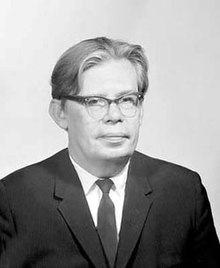Nikolay Bogolyubov
| Nikolay Nikolayevich Bogolyubov | |
|---|---|
 |
|
| Born |
21 August 1909 Nizhny Novgorod, Russian Empire |
| Died | 13 February 1992 (aged 82) Moscow, Russian Federation |
| Nationality | Soviet, Russian |
| Fields | Theoretical physics, mathematical physics, mathematics |
| Institutions |
Kiev University Steklov Institute of Mathematics Lomonosov Moscow State University Joint Institute for Nuclear Research |
| Doctoral advisor | Nikolay Krylov |
| Doctoral students |
Dmitry Zubarev Yurii Mitropolskiy Sergei Tyablikov Dmitry Shirkov Boris Medvedev |
| Known for |
Significant contribution to nonlinear mechanics, quantum field theory, statistical mechanics, superconductivity, superfluidity; |
| Notable awards | Stalin Prize (1947, 1953) USSR State Prize (1984) Lenin Prize (1958) Heineman Prize (1966) Hero of Socialist Labor (1969, 1979) Max Planck Medal (1973) Lomonosov Gold Medal (1985) Dirac Prize (1992) |
Significant contribution to nonlinear mechanics, quantum field theory, statistical mechanics, superconductivity, superfluidity;
Nikolay Nikolayevich Bogolyubov (Russian: Никола́й Никола́евич Боголю́бов; 21 August 1909 – 13 February 1992), also transliterated as Bogoliubov and Bogolubov, was a Soviet mathematician and theoretical physicist known for a significant contribution to quantum field theory, classical and quantum statistical mechanics, and the theory of dynamical systems; He was the recipient of the 1992 Dirac Prize.
Nikolay Bogolyubov was born on 21 August 1909 in Nizhny Novgorod, Russian Empire to Russian Orthodox Church priest and seminary teacher of theology, psychology and philosophy Nikolay Mikhaylovich Bogolyubov, and Olga Nikolayevna Bogolyubova, a teacher of music. The Bogolyubovs relocated to the village of Velikaya Krucha in the Poltava Governorate (now in Poltava Oblast, Ukraine) in 1919, where the young Nikolay Bogolyubov began to study physics and mathematics. The family soon moved to Kiev in 1921, where they continued to live in poverty as the elder Nikolay Bogolyubov only found a position as a priest in 1923.
...
Wikipedia
